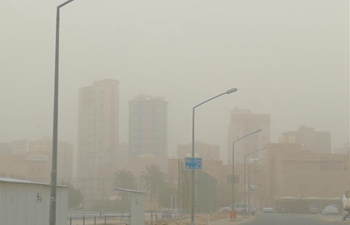GAZA, May 10 (Xinhua) -- Chief of Islamic Hamas movement in the Gaza Strip Yehya Sinwar warned Thursday that the loss of hope among the Gaza Strip's populations would turn the coastal enclave into a ticking bomb that might explode at any time.
Sinwar's warning was made in a two-hour meeting held at his office with bureau chiefs and media in coordination between Hamas-run government press office in Gaza and the Foreign Press Association in Jerusalem.
Sinwar clarified to foreign journalists the reasons behind organizing the six-week marches of return on the eastern area of the Gaza Strip, close to the border with Israel, which started in March 30 and will reach its peak on May 15.
"Over the past 70 years, the Palestinians suffered a great injustice and around one million Palestinians were forced to leave their lands and since then, they have been living scattered in refugee camps and all over the world," he said.
On May 15, the Palestinians will mark 70 years for the Nakba Day, one day after the 70th anniversary of Israel's declaration of independence. Organizers of the Great Marches of Return are determined to send tens of thousands of Palestinians in Gaza to demonstrate at the fence along the border with Israel.
He added that the United States will move its embassy to Jerusalem on May 14, an action "that is totally rejected by the Palestinians," he said.
He said as the Palestinians have been suffering displacement for 70 years and have been living under a tight Israeli siege for 12 years, "the Israeli occupation totally denied our legitimate rights and practiced all actions of repression, humiliation and persecution."
Sinwar, who was elected as Hamas chief in the Gaza Strip, said that the Gaza Strip won't be fitting for human living in 2020 "because the Israeli blockade had struck all aspects of life and forced the populations to be unable to live a dignified life."
The Hamas leader served 25 years in Israeli prisons and was released in a prisoner swap brokered between Hamas and Israel by Egypt in 2011, where 1,000 prisoners were released from Israeli jails for the release of an Israeli soldier captured in Gaza in 2006.
"I lived in Israeli prisons for around 25 years and after I was released, I discovered that life in the small Israeli prisons was much better than life in the big jail called the Gaza Strip in terms of food, electricity and medical services," he said.
He added that "95 percent of Gaza water is not drinkable, 80 percent (of the population) are living under the poverty line, 60 percent lost nutrition security, 45 percent are unemployed, and the most important thing is the sector of youths, who are the vast majority, had lost hope for having a dignified life."
"Such a horrible situation in the Gaza Strip had pushed the populations to join the marches of return calling for their right of return and breaking the siege," said Sinwar, adding that "these marches are peaceful and our people love peace and love life."
He stressed that during 42 days of peaceful and popular marches, the Israeli army killed around 50 people and wounded 8,000 others, adding "I challenge the Israeli side if one single Israeli soldier was injured during these marches."

















